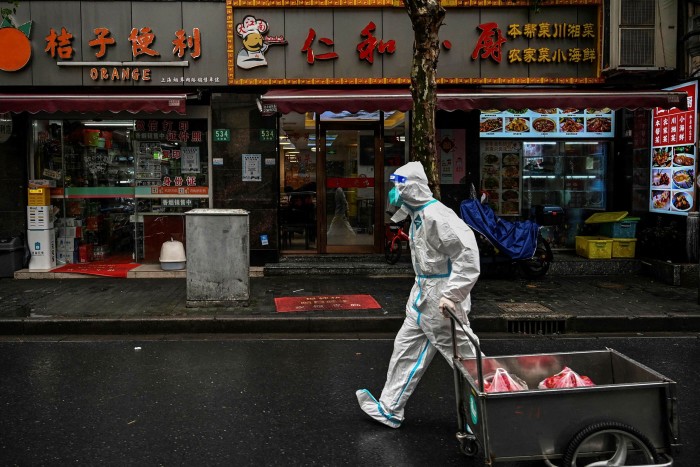Beijing digs in to avoid repeating Hong Kong’s Covid mistakes
In late February, Xi Jinping’s Covid tsar travelled south to Hong Kong where he witnessed panic and chaos sweeping through the financial hub as body bags overflowed from intensive care units and mortuaries while the city struggled to find enough coffins.
Liang Wannian, who heads the Covid-19 response team at the National Health Commission, returned to Beijing 12 days later under no illusions: even under China’s zero-Covid policy, healthcare systems could be swiftly overwhelmed by Omicron, inflicting mass casualties among older citizens.
Since the start of March, China has recorded more than 20,000 cases of the rapidly transmitting coronavirus variant. Tens of millions of people have been locked down in their apartment compounds and factories have shut, including in the southern technology hub of Shenzhen.
The latest outbreak is frustrating Beijing’s efforts to escape from its zero-Covid policy more than two years after the initial explosion of coronavirus cases from Wuhan.
Xi told a top Chinese Communist party body on Thursday that virus containment had to be achieved at a minimal cost and endorsed the use of more targeted measures to soften the economic blow.
However, he also directed officials to focus on “early detection, early reporting, early isolation and early treatment”, and reiterated that China’s pandemic controls “demonstrate the advantages of the CPC’s leadership and the socialist system”.

Underlying Beijing’s caution is the fear of a deadly outcome, repeating Hong Kong’s failures but on a huge scale.
Data released by China’s health officials this week revealed that about 50mn Chinese aged 60 and over — 20 per cent in that age bracket — were not fully vaccinated. Two-thirds of China’s severe Covid-19 cases involve elderly people who are not vaccinated.
Jerome Kim, the Seoul-based director-general of the International Vaccine Institute, said inoculating people “at greatest risk of death” was critical if China was to halt the spread of Omicron and move beyond its relentless lockdowns.
“You don’t want to be in the situation that Hong Kong was, where, for whatever reason, 70 per cent of the elderly decided not to get vaccinated,” he added.
While China has delivered 3.2bn vaccine doses across its population of 1.4bn, there are doubts over its inoculation coverage as well as the effectiveness of the country’s jabs.
“Against older variants and particularly at a time relatively close to vaccination, they were saying that the vaccines were effective. How that works against Omicron now, six to nine months after the initial vaccinations, is a second question,” said Kim.
Some health experts believe China should buy foreign-made vaccines that use more advanced mRNA technology, such as those made by BioNTech/Pfizer and Moderna. Beijing is yet to approve the BioNTech vaccine for general use despite an agreement made with Chinese company Fosun to supply 100mn doses to the country.
Elsewhere, such as in Hong Kong, experts have recommended that those who have received two doses of Sinovac receive a BioNTech booster because the Chinese vaccine, which uses the older inactivated virus technology, is less effective against Omicron.
“China has had no exposure to the virus, so when the virus gets in, anyone who is under vaccinated is also really vulnerable,” said Karen Grepin, a health policy expert at University of Hong Kong. Unlike in other countries that have suffered mass outbreaks, “the unvaccinated are completely immunologically naive”.
There are signs that the government’s initiatives to speed up vaccinations for the elderly are having an effect.
Medical staff at a local vaccination centre in the capital’s Daxing district said many elderly people had recently received their first jab, while another in Chaoyang distinct was running out of shots each day because of rising demand.
However, vaccine hesitancy is still prevalent among some groups of elderly people and their families.
At one home for the elderly in Fangshan district, south-west Beijing, staff said of 120 residents only about 50 had received two vaccine doses. “It’s their families that are reluctant to get them vaccinated, not the elderly themselves,” a carer said.
At another facility, also in Fangshan, most residents had two jabs but others had resisted receiving a single dose, fearful of complications to underlying illnesses. “There are some people who are afraid,” a staff member said.
Studies found the elderly have higher vaccine hesitancy in China than other adults, with concerns about jab safety, as well as the lower infection risk under Beijing’s zero-Covid strategy reducing uptake.
“Just like the situation in Hong Kong . . . partly because of complacency, they felt good that they were so successful in containing the virus,” said Jin Dong-yan, epidemiologist at the University of Hong Kong. “The same is true in China . . . because of zero-Covid people think there is no need to get vaccinated.”
Xi’s latest intervention followed a series of tweaks to the zero-Covid policy. That included expanding the range of approved test kits, shaving time from isolation periods for those who have recovered and raising the bar for hospitalisations. All mild and asymptomatic cases, however, will still be detained in quarantine facilities.
Most analysts believe there is little chance that the state’s heavy-handed pandemic controls will disappear entirely in the next 12 months. This year is critical for Xi as he breaks precedent to cement a third five-year term in power. In a year where social and political obedience is paramount, personal freedoms will be sacrificed for stability.
Ting Lu, Nomura’s top China economist, said Beijing’s latest changes marked neither an end to zero-Covid nor a road map to a new living-with-Covid strategy. “We maintain our view that the likelihood of Beijing releasing its [zero-Covid] grip before March 2023 is very small,” he added.
Additional reporting by Maiqi Ding and Nian Liu
For all the latest Business News Click Here
For the latest news and updates, follow us on Google News.
